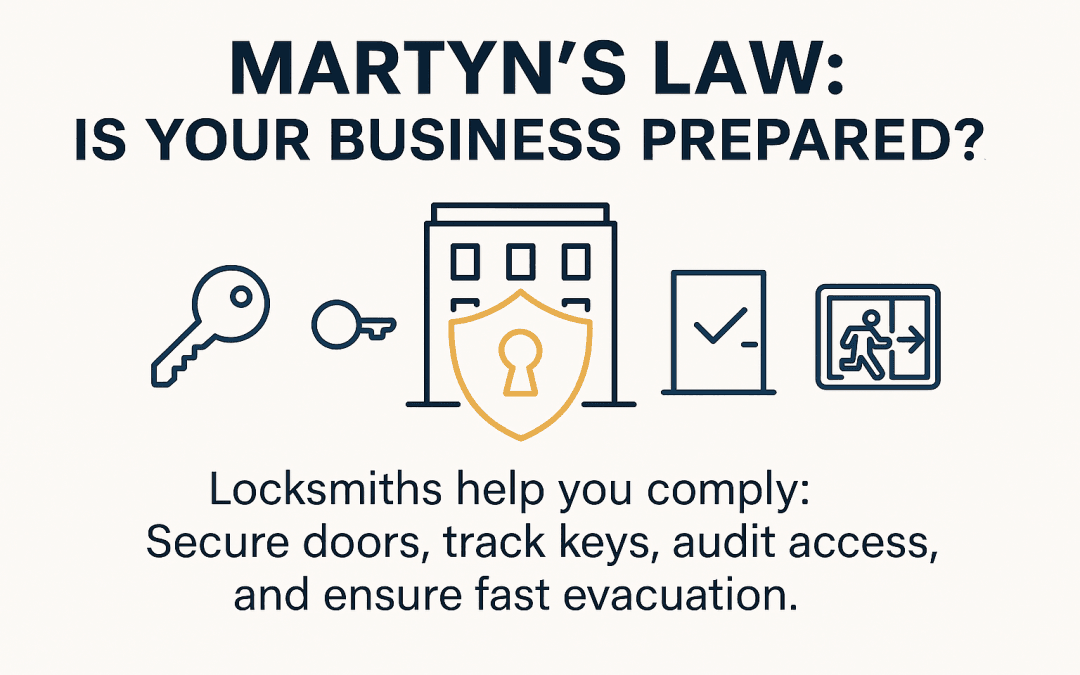Martyn’s Law: What Your Business Needs to Know

For friendly & knowledgable service contact us on:
0330 100 5313 hello@williamchannon.co.uk

On 3 April 2025, the UK Government passed the Terrorism (Protection of Premises) Act, better known as Martyn’s Law. Named in honour of Martyn Hett, who lost his life in the Manchester Arena attack, the legislation is designed to ensure that public premises and events are better prepared for terrorist threats.
Although the Act won’t come into force until at least early 2027, businesses need to start preparing now.
What Is Martyn’s Law?
Martyn’s Law is the UK’s new counter-terrorism legislation requiring certain public premises and events to have proportionate safety measures in place.
The law introduces a tiered approach based on capacity:
- Standard Tier (200–799 people)
- Notify the Security Industry Authority (SIA)
- Put in place public protection procedures (evacuation, invacuation, lockdown, communication protocols)
- Focused on low-cost, practical measures and staff training
- Enhanced Tier (800+ people or large public events)
- All of the above, plus documented risk assessments
- Enhanced physical security such as CCTV, access control, barriers, perimeter checks
- A senior individual formally responsible for compliance
Who Does Martyn’s Law Apply To?
Martyn’s Law applies to a wide range of premises and events where large groups of people may gather. These include:
- Schools and universities – requiring clear lockdown and invacuation protocols to keep pupils and staff safe.
- Healthcare facilities – ensuring hospitals and clinics balance public access with secure, staff-only zones.
- Retail and hospitality venues – managing fluctuating visitor numbers with evacuation and crowd safety measures.
- Heritage sites and cultural spaces – protecting visitors while maintaining accessibility and conservation.
- Places of worship and community venues – ensuring protective procedures are in place for regular gatherings and events.
If your premises regularly host 200 or more people, it’s likely that Martyn’s Law will apply.
Why It Matters for Businesses
Preparedness isn’t just about compliance — it’s about protecting people. Terrorist threats are unpredictable, but the ability to lock down, evacuate, or communicate clearly can save lives.
For smaller premises, measures may be straightforward and low-cost. For larger venues, investment in scalable and integrated security systems will be essential.
From our work across the UK, some of the most frequent gaps we find include:
- Fire door locks installed without proper testing or certification, compromising safety and compliance
- Uncontrolled access due to lost, copied, or untracked keys
- Outdated padlocks and mechanical systems in high-risk areas
- Doors and exit routes that don’t support quick evacuation
- Staff unsure of lockdown, invacuation, or evacuation procedures
- CCTV systems with blind spots or outdated recording equipment
- Weak perimeter protection through fencing, gates, or barriers
- Access systems that lack audit trails, making it difficult to track usage
- Emergency communication systems not tested or unreliable
- Locks, hinges, and closers not maintained, leading to higher risk of failure
How William Channon Can Help
At William Channon, we’ve been securing UK premises since 1917. Our team understands both compliance and practical realities — helping businesses prepare in proportionate, effective ways.
We provide:
- Free site surveys to assess your current security setup
- Expert advice on access control, emergency egress, and secure entry systems
- Tailored solutions for both Standard and Enhanced Tier premises
- Compliance-ready upgrades aligned with Martyn’s Law requirements
Don’t Wait Until 2027
With at least a two-year implementation window, it may be tempting to delay preparations. But getting ahead now means avoiding rushed, costly upgrades later, building staff confidence through training, and ensuring your systems are scalable for future compliance.
Book a call today to find out how we can help you get ahead of Martyn’s Law, and protect your people, your premises, and your peace of mind.
References:
People we typically help


Security Managers
Keeping your building and colleagues safe is crucial. If you experience a break in, loss of keys or just need advice on an existing system having a locksmith and access control specialist at hand, who are ready to react quickly and efficiently is essential.

Estate or Facilities Managers
Whether you are in charge of a single or multiple sites, security will be one of the main things you are responsible for to keep your buildings running smoothly. We can offer peace of mind that you are fully supported ongoing for anything security related.

Maintenance Managers
Your day to day building maintenance duties will be quite varied but we understand that maintaining safety as well as building access will no doubt be towards the top of that list. We have supported maintenance managers for decades so rest assured we have you covered.

Homeowners
Whether you are locked out of your home, or simply need to feel more safe and secure we can offer advice on the best products available as well as offer full installation.
None of the above sound like you? No problem, whilst these are the people we most commonly help we've worked on projects for all sorts of professionals so contact us below to talk to us about your requirements.
How can we help?
Fill out the form below, or if you would prefer you can call us on 0330 100 5313
or email us at hello@williamchannon.co.uk
Some of our trusted suppliers





TESTIMONIALS
What Our Customers Say
